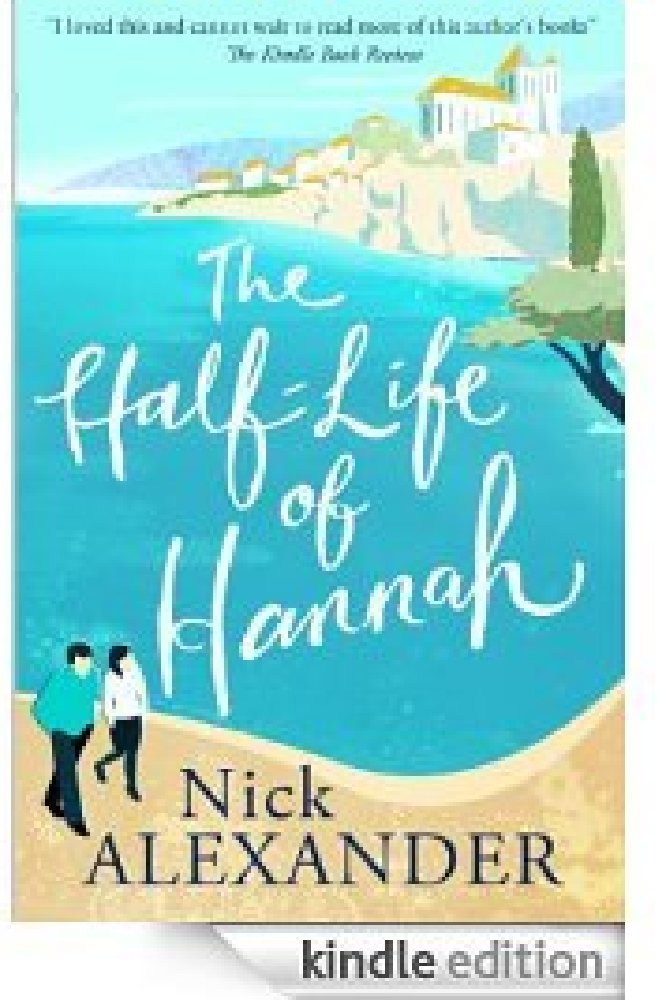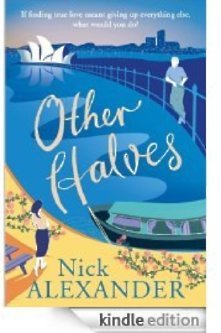
The Half Life of Hannah
The Half-Life of Hannah tells the story of a woman who has spent the first half of her life in a fairly lacklustre marriage. She has convinced herself that this is as good as it gets, and has managed to be fairly content with her lot, but during a family holiday to France she makes a discovery that changes everything. A secret, revealed, makes her realise that her husband isn’t the man she thought he was, and that completely different options were available to her at various points of her life. So she suddenly has to re-evaluate not only where she has come from, but where she’s going, too.

Other Halves, the sequel to The Half-Life of Hannah, is written alternately from Hannah’s point of view, and from that of her husband. Essentially, it explores the fact that reality and experience are not absolutes, but are, in fact, very personal. I found it really exciting to contrast the thoughts and processes of both halves of a couple as their relationship breaks down and as they struggle to build new lives and loves for themselves. It’s really quite novel, I hope, to be dragged back and forth between their two very different points of view. In real life we so rarely get to glimpse both sides of the story!
You were born in Margate- so what took you to France where you now live?
My parents were great Francophiles, and dragged us around France as children on a never-ending series of rather muddy camping holidays. So I think I grew up thinking that it was fun to be in France right from the get-go. Then in my twenties, I became overcome by a feeling that my life was too stable, that I hadn’t had enough adventure to settle down yet. So I sold everything up, and quite literally headed off with a backpack. When I got to Nice, I found that I really, really liked it there, and just kind of got stuck.
What appeals to you about Nice and The Southern French Alps where you divide your time?
Well, I love change, and I love the sun and the sea, but also skiing and snow... The transition from the coast to the Alps here is abrupt and stunning. I’m a keen motorbike rider, and within in an hour you can ride from sun-drenched beaches to white-capped mountains. The roads are some of the most beautiful biking roads in Europe, too. So I guess being able to flit back between the sunny, touristy Cote d’Azur and the mountain isolation of the Alps, just about strikes me as perfect. For many years I kept saying, “Just one more ski season,” and then, “Just one more beach summer,” and “Then I’ll go home.” Eventually, it dawned on me that I had spent more of my adult life here than in England – that this had become home.
Please tell us about the characters of Hannah and Cliff.
Hannah is a strong, reasonable, down to earth woman. She doesn’t realise it, but she has huge reserves of strength and willpower that for the first half of her life she has used to make a success of what is really a rather difficult marriage. She’s jealous of the excitement of her tear-away sister’s lifestyle, but doesn’t believe herself capable of living that way.
Sadly, a couple of essential bits of information have been withheld from her, which would have enabled her to make entirely different (and better) choices. But all is not lost... she’s only halfway through her life, after all. In Other Halves, we see her using all her strength to build something new and different and rather lovely from the broken pieces of her life.
Because The Half-Life of Hannah is written almost exclusively from Hannah’s point of view, Cliff doesn’t come across as a particularly nice character in that book, and that’s entirely intentional. The drama revolves around Hannah, and Cliff is depicted merely as the cause of much of her angst. But in Other Halves, I decided to give Cliff a voice too, and I really enjoyed it. It’s exciting, as a writer, to be able to take someone who has apparently acted despicably, and show the entire path that lead him to where he ended up. And with understanding comes forgiveness. Ultimately I hope the reader comes to understand, forgive, and maybe even love Cliff a little bit. He has, it turns out, been through a lot, and all he ever did was the best he could manage. Which, let’s face it, is all that any of us ever do.
What drew you towards writing family drama with heart?
I’ve always thought that there is nothing more interesting in life than how people think, why they do what they do, and how we humans constantly misunderstand each other. Between what I say, and what you hear, and what I think you’ve heard, there is so much room for confusion, it’s amazing that any of us ever agree on anything. Exploring all of that is about as much fun as a writer can have, and the family, with all of the drama, the criss-crossed relationships, both chosen and imposed, the secrets, the lies, the love... well, it’s the perfect setting to explore human relationships.
Please tell us where your writing journey began.
I was always a wordy child writing silly poems and limericks and such. Then, in my thirties, I found myself going through a sort of chain-dating hell that was so outrageously awful, where the dates I met were so horrifically unsuitable, that it started to seem funny to me, Monty-Pythonesque in a way. I started to write down some of these dreadful dates, and found that process of turning hurt to humour, life to fiction, was healing and somehow addictive. A lot of these stories, heavily fictionalised, ended up going into my first novel, 50 Reasons to Say Goodbye. And when that turned out to be successful, I just didn’t stop.
How inspiring do you find living where you do for your writing?
Oh, I love it. I’m incredibly affected by the weather, by what people call Seasonal Adjustment Depression Syndrome, and living somewhere where there are three-hundred and twenty days of sun a year means that I’m able to be up and functional and busy most of the time instead of moping around in the dark. Being an outsider to a different culture means that one is constantly in observation mode, as well, which is pretty useful if you’re trying to write. And finally, my place up in the mountains is so isolated, so beautiful, but ultimately also so very, very boring (no cinema, no bar, no shop of any description) that I’m actually able to get lots of work done.
What is next for you?
I’m currently working on a fairly chunky family drama set in the East end of London. Currently (it’s still very much in progress) it’s constructed using two timelines, one during the poverty and terror of the Blitz, and the other in today’s trendy hipster reinvention of the East end. Just as Hannah and Cliff see themselves and each other very differently, in this novel the idea is to contrast the way children see and understand their parents’ lives, with the actual experiences those parents lived through. Researching life amongst the rubble of the Blitz has been a real eye opener, and by throwing in a few skeletons in cupboards, I’ll hopefully be able to create some real heart wrenching drama. That’s what I’m aiming for, anyway.
The Half Life of Hannah by Nick Alexander is out now, published by Black & White, price £7.99 paperback original
Other Halves by Nick Alexander is published by Black & White on the 5th June 2014, price £7.99 paperback original

